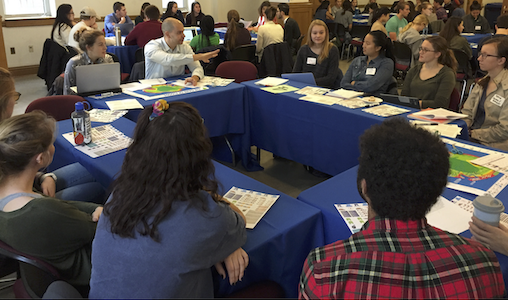Examples of Current Innovations

Enhancing and Transforming the Core Curriculum
Developmental, extended grants
Writing Program, “Writing for Others”: building on the Jesuit value of “people for others,” this proposal promotes a vision of writing as an essential tool for informing, engaging, persuading, and working for and with others, by promoting authentic writing projects in which students apply their learning to address the needs of specific audiences and problems; thus, the project entails (1) designing several new sections of WRIT 015 in which students work with campus units to design and develop new communication strategies for particular audiences and contexts, and (2) designing strategies to help students in courses in the sciences (including but not limited to courses that fulfill the Integrated Writing requirement) understand the audiences, genres, and challenges of writing in and about their fields.
Performance & Government, “Performing One Another”: the Government Department and Georgetown University’s Laboratory for Global Performance and Politics (LGPP) partnered on the project “Performing One Another,” an initiative to integrate a pilot political theater course into the college curriculum through a 5-credit spring class that aims to widen the circle of engagement and enhance the impact of this effort on the Core.
Humanities, Arts, Literature, and Culture (HALC), “Faculty Fellows Cohort”: connecting six distinct HALC courses via common experiences, common work, cross-section presentations and discussions, and a symposium featuring examples of student learning through courses that introduce the cultural humanities; this project emerges from PODS work during TLISI 2019, focusing on designing a pilot program for connecting HALC sections and for refining learning objectives in HALC.
Center for Social Justice & Theology Department, “Practical Theology: First-Year Students, ‘The Problem of God,’ and Washington, DC”: delivery of a Problem of God section/course in the spring tailored toward this year’s FOCI cohort who will have worked on community-oriented projects together; this is a pilot project that could be operationalized in more sections next year, and that likewise can demonstrate proof of concept for similar programming around alternative breaks and more.
Exploratory, shorter-term grants
Comparative Literature Program, “Literature and the Global”: transforming an existing CompLit course into a new Core course called “Literature and the Global,” with four primary goals: to broaden and maintain student engagement with literature, to involve students in the design and execution of the course, to connect literary study to engagement with global diversity, and to grow that engagement over time; the course would be tagged for the HALC and global diversity Core requirements.
Science Departments, “Introductory STEM Courses”: working across six undergraduate natural, computational, and quantitative science departments (Biology,Chemistry, Computer Science, Human Biology, Mathematics & Statistics, and Physics)and undertaking a collaborative effort to apply for a Howard Hughes Medical InstituteInclusive Excellence award for a longer-term project; this year will entail a four-stage process: (1) data collection and analysis of student trajectories in the STEM disciplines at Georgetown (2) syllabus review and interviews with faculty of the introductory courses (3) focus groups and one-on-one interviews with students to better understand student perspectives on the utility of introductory coursework, and (4) a landscape analysis of external models to learn from the broader scientific community.
Women’s & Gender Studies Program, “Building a Core Course on Title IX Issues”: developing a student-led, inquiry-based, aspirational, trans-disciplinarily course on realizing gender equity in higher education, with a specific focus on sexual harassment and assault; the project has three phases, including exploratory work in summer 2019, running an Interdisciplinary Design course (IDST 312) in the fall to develop a new course, and finally delivering that course in spring 2020.
Walsh School of Foreign Service, “The Science of the School of Foreign Service”: designing an experimental course aimed at providing an understanding of the science behind some of humanity’s most pressing problems, including nuclear war, climate change, technological disruption, emerging infectious diseases, and space exploitation; the class will be structured each semester as a series of three independent 1-credit modules while being framed as a cohesive whole, with students completing 3 modules meeting an SFS and GU main campus science requirement.
Office of Global Education, “Teaching, Learning, and Building Community at Villa Le Balze”: revitalization of undergraduate learning at Georgetown’s Villa Le Balze, through curriculum integration efforts aligned with the Georgetown Core, and by infusing a structured pedagogy of experience, reflection, and community-building into the residential living and learning experience; reimagining the Villa’s undergraduate study program as an integrative global learning experience targeted to students in the sophomore year and adding a signature global dimension to how students can experience the Core that capitalizes on the unique advantages and opportunities of an overseas program while remaining distinctly Georgetown.
Department of Philosophy, “Transforming Intro to Ethics”: developing an approach to PHIL 010 (Introduction to Ethics) that is more integrative, less lecture- bound, and more student-centric, striving to create a shared, reflective experience in this portion of the Core; the process entails building a two-week module that takes up a traditional philosophical topic (that of a flourishing or worthwhile life) and connects it to students’ experiences at Georgetown and beyond in pedagogically innovative and student-led ways, designed by a team of students and faculty that will create and implement a transformative approach to this Core course.
